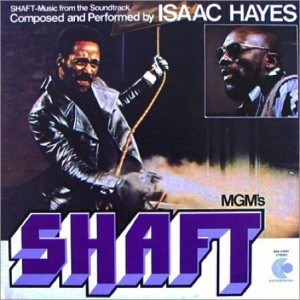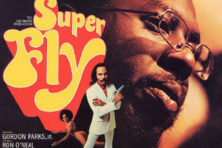Shaft Among Latest in National Recording Registry
- Share
- Tweet
- Pin
- Share
You see this cat Shaft is a bad mother
(Shut your mouth)
But I’m talkin’ about Shaft
(Then we can dig it)
But can you dig this – Isaac Haye’s 1971 double Stax album from the soundtrack of Gordon Parks’ film Shaft is among the latest inductees to the Library of Congress National Recording Registry, as well it should be. It was the top-selling album ever for the legendary Stax label, and Hayes was the first African American to win an Oscar for a non-acting category when his “Theme from Shaft” won the award for Best Original Song.
Who’s the cat that won’t cop out
When there’s trouble all about
Shaft, right on!
Established by the National Recording Preservation Act of 2000, the National Recording Registry began in 2002 to name 25 recordings annually – nominated by we the people and members of the National Recording Preservation Board, which is comprised of leaders in the fields of music, recorded sound and preservation – that are to be preserved by the Library of Congress because they are “culturally, historically, or aesthetically important, and/or inform or reflect life in the United States.” The latest batch was announced on April 2.
In addition to Isaac Hayes, the list includes Creedence Clearwater Revival’s Vietnam War-era single “Fortunate Son,” Elmore James’ blistering 1951 slide guitar rendition of “Dust My Broom,” U2’s 1987 album Joshua Tree, Linda Ronstadt’s 1974 album Heart Like a Wheel, Jeff Buckley’s version of Leonard Cohen’s “Hallelulah,” Buck Owens’ Carnegie Hall Concert with Buck Owens and His Buckaroos (1966), the Everly Brothers’ “Cathy’s Clown” (1960), Louis Jordan’s rocking 1945 single “Caldonia” (“Caldonia! Caldonia! What makes your big head so hard?”), and two versions of the Great Depression classic “Brother Can You Spare a Dime,” recorded by crooners Rudy Vallee and Bing Crosby in 1932.
But it’s not all music. There is a massive collection of recorded Cabinet meetings and telephone calls of President Lyndon Johnson, rare interviews with baseball pioneers of the late 19th and 20th centuries, a 1962 comedy album spoofing President John F. Kennedy and his family that was pulled from distribution after his assassination, a 1942 episode of the popular radio show The Goldbergs, and field recordings documenting the culture and traditions of a disappearing Native American tribe.
And it’s not all pop and rock. Jazz is represented in hard-bop form with the 1954 A Night at Birdland (Vols. 1 and 2) by Art Blakey and The Jazz Messengers (which at that time included Horace Silver, Clifford Brown and Lou Donaldson). Classical is represented with Copland Conducts Copland: Appalachian Spring. Broadway gets a nod with the 1979 original cast recording of Stephen Sondheim’s Sweeney Todd. And salsa is represented by the 1974 album Celia and Johnny by Celia Cruz and Johnny Pacheco (1974).
“These recordings represent an important part of America’s culture and history,” said Librarian of Congress James H. Billington in announcing the latest inductees. “As technology continually changes and formats become obsolete, we must ensure that our nation’s aural legacy is protected. The National Recording Registry is at the core of this effort.”
The Library is currently accepting nominations for the next registry at the NRPB website (loc.gov/nrpb/).


